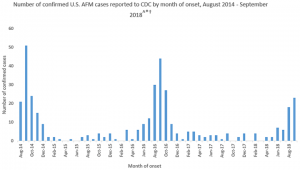A secretive illness Polio-like a disease that is sickening and notwithstanding incapacitating kids is inciting admonitions this week from government wellbeing authorities to look for medicinal consideration quickly should anybody build up its side effects.
Intense flabby myelitis (AFM), a to a great degree uncommon however genuine condition that influences the sensory system and makes the body’s muscles and reflexes end up frail, is on the ascent the nation over, the Centers for Disease Control and Prevention said on Tuesday.
In spite of that caution, there is a considerable measure of questions about the polio ike ailment, including what causes it and why it influences more youngsters ― at the normal age of 4 ― than grown-ups.
“In excess of 90 percent of the cases are in youngsters age 18 years and more youthful,” Nancy Messonnier, the chief of the National Center for Immunization and Respiratory Diseases, said at a CDC question and answer session.

A girl recovers after contracting acute flaccid myelitis (AFM), a rare but serious condition that affects the nervous system and causes the body’s muscles and reflexes to become weak.
“Regardless of broad lab testing, we have not figured out what pathogen or safe reaction caused the arm or leg shortcoming and loss of motion in many patients,” she said.
Infections, natural poisons, and hereditary issue are among the associated causes with the ailment, which regularly starts with fever, respiratory issues, and muscle shortcoming.
“This is really a quite emotional malady. These children have a sudden beginning of shortcoming,” said Messonnier.
Aaron Michael Milestone, a partner disease transmission specialist at Johns Hopkins Hospital in Baltimore and a partner educator of Pediatrics, called attention to that the ailment is more unmistakable in the fall amid the respiratory and influenza season, which could make it less demanding to go undetected at first.
“Pretty much every parent who has a youthful tyke, at some point in October or the winter, their youngster will have some chilly or poor quality fever or something,” he told.
“They’re giving shortcoming in some piece of their body. It could be an arm, it could be a leg, it could be more,” he said of the patients’ manifestations. “Once in a while, it stops there, in some cases it advances. Also, as you would expect, it’s exceptionally startling for guardians.”
To help keep the ailment’s spread, the CDC prompts appropriate hand washing, remaining avant-garde on antibodies and utilizing mosquito repellent to stay away from Nibbles.

There have been 386 confirmed cases of acute flaccid myelitis in the U.S. since 2014. The CDC has stressed that the number of cases is rising.
As of now, there is no vaccine or treatment for AFM.
“It means we’re stuck kind of waiting and watching to see how kids do and not being confident that we can really intervene at this point to improve their outcomes,” Millstone said.
The illness’ long-term effects are not known, and outcomes have been different for patients, with some recovering quickly and others having lasting paralysis and requiring ongoing care. There was one confirmed death last year, the CDC said on Tuesday.
Robin Roberts of Richmond, Virginia, spoke with NBC News about the death of her 5-year-old son, Carter, last month after he became paralyzed from his nose down because of the illness in 2016










